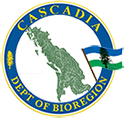A Case Study in Integral Watershed Management: Radical Inclusivity in the Slocan Valley
This workshop will explore the principals, practices and lessons learned form a highly successful community-based watershed management project based in the Slocan Valley near Nelson, British Columbia. After 30 years of failed attempts by government agencies Stephen Martineau and his team of facilitators worked in unique and sometimes counterintuitive ways, referred to as Integral Mediation and Ecology, to pull together a diverse set of often polarized stakeholders to devise a plan that was acceptable to all. Join us to learn what the principals and practices are of this approach and to reflect on its applicability to your region.



